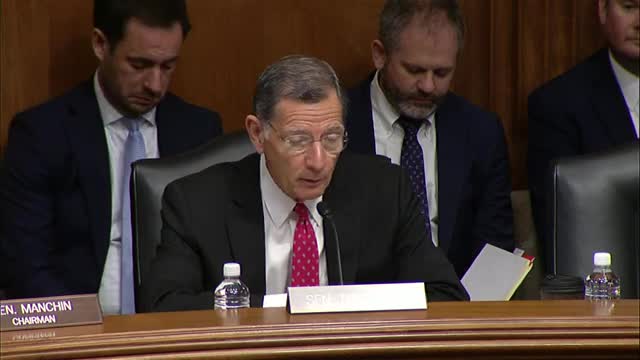Energy Crisis Looms as Secretary Faces Wyoming's Fury
July 10, 2024 | Energy and Natural Resources: Senate Committee, Standing Committees - House & Senate, Congressional Hearings Compilation

This article was created by AI summarizing key points discussed. AI makes mistakes, so for full details and context, please refer to the video of the full meeting. Please report any errors so we can fix them. Report an error »

During a recent government meeting, discussions centered on the critical role of energy and mineral development on federal lands, particularly in Wyoming, which is a leading producer of coal, uranium, and natural gas. The state relies heavily on these resources, with nearly 50% of its land and 70% of its minerals owned by the federal government. In 2021, oil and gas production contributed approximately $12 billion to Wyoming's economy, supporting around 58,000 jobs in a state with a population of just 500,000.
Concerns were raised regarding the current administration's policies under Secretary of the Interior Deb Haaland, which have been perceived as detrimental to Wyoming's energy sector. Critics highlighted that over the past three years, the Secretary has canceled two years' worth of oil and gas leases, significantly delayed permit timelines, and placed millions of acres of existing leases on hold. Additionally, proposals to prohibit coal leasing in the Powder River Basin, a major source of U.S. coal, and to restrict grazing and mineral development on federal lands were described as reckless and harmful to both the state's economy and national energy security.
The meeting also featured the nomination of a new deputy secretary for the Department of the Interior, who emphasized a commitment to communication and transparency in addressing the diverse needs of stakeholders across the country. The nominee, who has extensive experience in resource management, expressed a desire to foster better decision-making through understanding various perspectives.
As the committee prepares for further discussions, the focus remains on whether the new deputy secretary will advocate for Wyoming's interests and whether the administration will shift its approach to energy and mineral development on federal lands. The outcome of these deliberations could have significant implications for the state's economy and the broader national energy landscape.
Concerns were raised regarding the current administration's policies under Secretary of the Interior Deb Haaland, which have been perceived as detrimental to Wyoming's energy sector. Critics highlighted that over the past three years, the Secretary has canceled two years' worth of oil and gas leases, significantly delayed permit timelines, and placed millions of acres of existing leases on hold. Additionally, proposals to prohibit coal leasing in the Powder River Basin, a major source of U.S. coal, and to restrict grazing and mineral development on federal lands were described as reckless and harmful to both the state's economy and national energy security.
The meeting also featured the nomination of a new deputy secretary for the Department of the Interior, who emphasized a commitment to communication and transparency in addressing the diverse needs of stakeholders across the country. The nominee, who has extensive experience in resource management, expressed a desire to foster better decision-making through understanding various perspectives.
As the committee prepares for further discussions, the focus remains on whether the new deputy secretary will advocate for Wyoming's interests and whether the administration will shift its approach to energy and mineral development on federal lands. The outcome of these deliberations could have significant implications for the state's economy and the broader national energy landscape.
View full meeting
This article is based on a recent meeting—watch the full video and explore the complete transcript for deeper insights into the discussion.
View full meeting